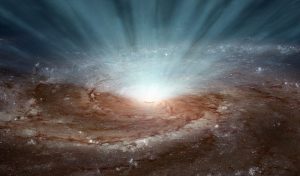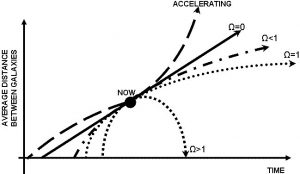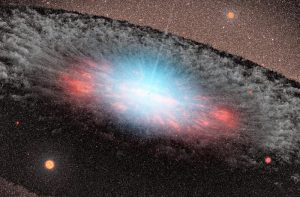White hole
White holes, which are theoretically the exact opposite of black holes, could constitute an important portion of the mysterious dark matter believed to make up most of the matter in the universe. And some of these strange white holes may even have existed before the Big Bang, according to studies and researchers. White holes are part of the theoretical world, and for this reason they have always been regarded as a kind of mathematical rarity and are not often taken into account by scientists as black holes are, as there seems to be no natural processes leading to their formation.
What is a white hole?
A white hole itself is a hypothesis that exists with respect to the theory of general relativity which tells us that this hole is the temporal reversal of a black hole, in which gravity expels matter.
Definition of white hole
According to what the general theory of relativity tells us, a white hole is a dubious region found in the universe to which it is impossible to access and from which, at the same time, light and matter escape. We can say in other words, that the white hole is all the opposite of a black hole. Then, the white hole is in which matter instead of being swallowed by force is expelled out of it, because it has an inverse force to that of a black hole.
The white hole is a term that has also been used to define the solution of the equations in Einstein’s gravitational field. It is a finite region found in space-time that is visible as a celestial object, letting matter and energy escape instead of absorbing energy.
Characteristics
The main characteristics of white holes are as follows:
- Inside the white hole, no type of object can remain inside for an infinite space or time.
- It is defined as the reverse side of a black hole, because it ejects everything that is inside it.
- It is a scientific assumption because to date, there is no knowledge of the true existence of a white hole.
- It is considered as the exit of a black hole towards another asymptotically flat region very similar to the region from which comes an object that emerges from another type of hole.
- Some consider the white hole to be the exit from the black hole.
- Since there is no mechanism opposed to gravity, they are not believed to exist.
History
This theory has had many advances and all of them have been thanks to the independent work of mathematicians Igor Nóvikov and Yuval Ne’eman during the 1960s. They were based on Kruskal–Schwarzschild’s solution of equations with respect to general relativity. White holes belong to theoretical world, and for this reason, from the beginning of their history, they have been considered as a mathematical rarity and they have not been taken into account much by scientists, since there do not seem to be natural processes that lead to their formation.
Hypothesis about the white hole
One of the hypotheses that exist regarding white holes is that this type of hole acts as an exit from a black hole to other different universes and for this reason it is proposed that the Big Bang is a white hole through which our universe was formed.
Another hypothesis that exists is the most modern, and tells us that unlike black holes, which have a well-studied physical process, is the collapse of gravity that occurs when a star larger than the sun ends its nuclear fuel, that there is no analogous process that indicates the production of white holes. It has been assumed that white holes are a kind of exit from black holes, and that both have singularities that could be connected by a wormhole.
How it differs from a black hole
A black hole is an area in space-time that is caused by a large concentration of mass in its inner part, with increased density that causes such a powerful gravitational field that no particle or energy can escape from it. The white hole is a term used to define a physical entity that has not yet been proven, but that are considered mathematically possible. It could be a finite region of space-time, which could be observed as a celestial object with such a potent density that it produces a deformation in space but allows matter and energy to escape rather than absorb it.
How to cite this article?
Briceño V., Gabriela. (2019). White hole. Recovered on 23 February, 2024, de Euston96: https://www.euston96.com/en/white-hole/










